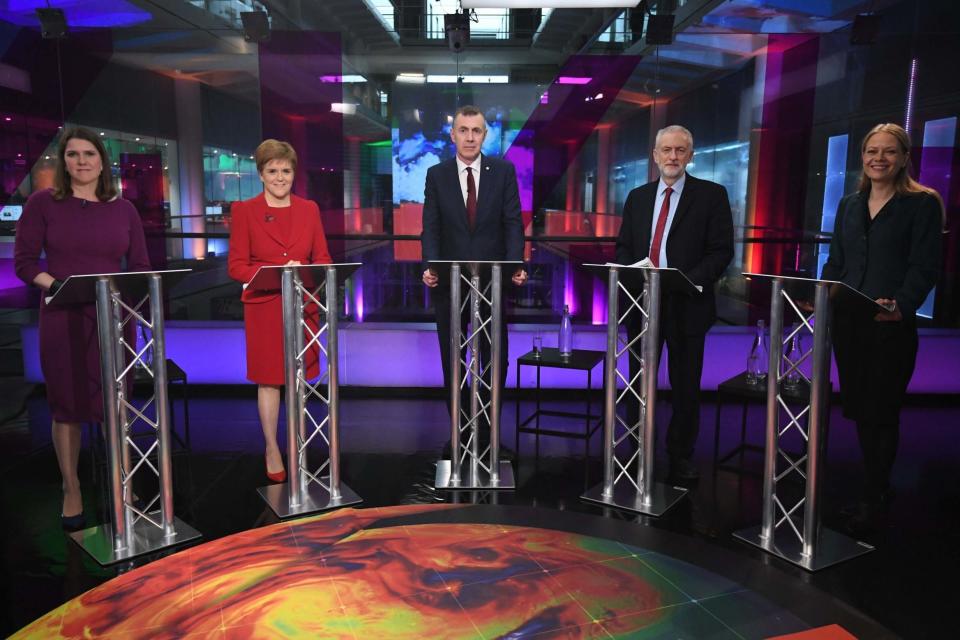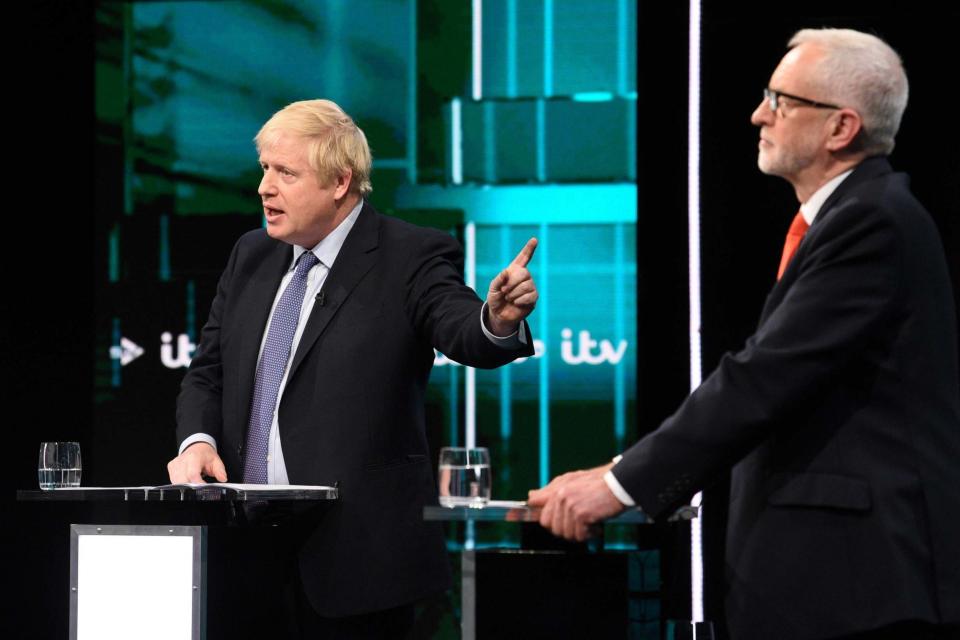General election TV debates: Which leaders have taken part in which showdowns

Noise around general election TV debates and interviews has made it hard to keep track of which party leaders have taken part in each media event.
Friday night will see the first seven-way election debate hosted by the BBC, which will be aired on BC One, the BBC News channel, and on iPlayer from 7pm.
The showdown will be broadcast live from Cardiff and chaired by Nick Robinson but neither Boris Johnson or Jeremy Corbyn are set to take part.
So far Mr Johnson has been accused of "running scared", one debate had to be scrapped, complaints have been sent to the broadcasting watchdog Ofcom over disputes and there has even been a High Court case.
Here's a look at the TV election debate drama so far...
What debates have already taken place?
Boris Johnson and Labour leader Jeremy Corbyn took part in a head-to-head debate on ITV on November 19, with some 6.7 million people tuning in.
On November 22, a peak audience of 4.6 million watched Mr Johnson, Mr Corbyn, Liberal Democrat leader Jo Swinson and SNP leader Nicola Sturgeon battle a barrage of hostile questioning on a BBC Question Time special.
Then, on November 29, Mr Johnson and the Brexit Party's Nigel Farage snubbed the Emergency On Planet Earth debate on Channel 4 News.
It was attended by Mr Corbyn, Ms Swinson, Ms Sturgeon, Plaid Cymru's leader Adam Price and Green co-leader Sian Berry.
Why did Mr Johnson not take part in the Channel 4 News debate?
Well, the Conservatives offered up former environment secretary Michael Gove to be the party's representative for the debate, and Mr Gove even turned up to the studio ahead of the programme.
But the editor of Channel 4 News, Ben de Pear, said they made clear to him "repeatedly" that his attendance was not required at the debate which was "strictly for party leaders only".

Two ice sculptures were placed on the stage to "represent the emergency on planet earth" and to act as a visual metaphor for the Tories and the Brexit Party, after their leaders declined the chance to take part.
What was the fall out from the Channel 4 News debate?
The Conservative Party made a formal complaint to Ofcom's election committee over what it said was "a provocative partisan stunt, which would itself constitute making a political opinion in its own right".
It came as Tory sources were reported as saying that if the party wins the coming election, it will reassess Channel 4's public service broadcasting licence.

However, other figures in the party have moved to downplay this speculation.
Labour's deputy leader Tom Watson wrote to Ofcom's chief executive Sharon White, urging her to "call out this meddling", adding: "This campaign, Boris Johnson has banned the Daily Mirror from its battle bus, ducked the Andrew Neil interview and now attempted to bully Channel 4."
What's this about an Andrew Neil interview?
Mr Johnson has repeatedly refused to commit to an interview with the BBC's veteran journalist, despite the fact that Mr Corbyn and Ms Sturgeon have faced a grilling from him in recent days and other party leaders are confirmed to sit down with him next week.
Ms Swinson will be in the hot seat on December 4, with Mr Farage taking his turn on December 5.
So, is the PM too afraid to face Mr Neil or is it part of his strategy?
Shadow chancellor John McDonnell reckons Mr Johnson is "running scared" of being interviewed by Mr Neil because he knows he will "take him apart".
Speaking to BBC Radio 4's Today programme, he said: "But even if he does it now, he's played you. because he pushing it later and later beyond the postal vote returns."
Mr Johnson has defended himself by referring to the multiple interviews he has been doing.
What happened in the High Court?
The Liberal Democrats and SNP lost a High Court challenge against ITV over its decision to exclude their party leaders from their debate involving Mr Johnson and Mr Corbyn.
The two parties contested the broadcaster's decision, arguing it was unlawful because it breached impartiality rules.

But two leading judges ruled the decision was not open to challenge in the courts and that the parties' only recourse was to complain to Ofcom.
Was a debate scrapped?
Yes. A Channel 4 election debate on the economy was scrapped amid claims from the Labour Party and SNP that Chancellor Sajid Javid was "running scared".
The two parties suggested that Mr Javid refused to take part in the debate, which shadow chancellor John McDonnell and the SNP's Ian Blackford had agreed to.
Channel 4 said plans for the debate were "currently on hold" as it was "not possible to reach an agreement with all parties".
Are there any more debates scheduled?
Yes. There is a seven-way debate taking place on the BBC on Friday evening, which neither Mr Johnson nor Mr Corbyn will attend.
Instead, Chief Secretary to the Treasury Rishi Sunak will replace Mr Johnson, and shadow business secretary Rebecca Long-Bailey will stand in for Mr Corbyn.
And ITV is hosting a debate on Sunday. but has not yet confirmed who will take part.
The BBC Prime Ministerial Debate is scheduled for December 6, which will see another head to head between Mr Johnson and Mr Corbyn, and on December 9, the BBC is planning a 90-minute Question Time for younger audiences featuring leading figures from each of the main parties.
How are audiences and questions selected?
Ahead of the debate on Friday evening, a BBC spokeswoman said supporters of the Conservatives and Labour will be roughly equal in the audience, followed by a smaller number roughly for the SNP and the Liberal Democrats, and a handful for the smaller parties.
She said questions will come from members of the audience recruited by Savanta ComRes, and from members of the public who have submitted questions via the BBC website.
The spokeswoman said questions will be chosen by the editorial team producing the programme, with the aim of reflecting the issues which matter to the public and which feature prominently during the election campaign.
Read more
What we know so far about the terror attack on London Bridge

 Yahoo News
Yahoo News 
